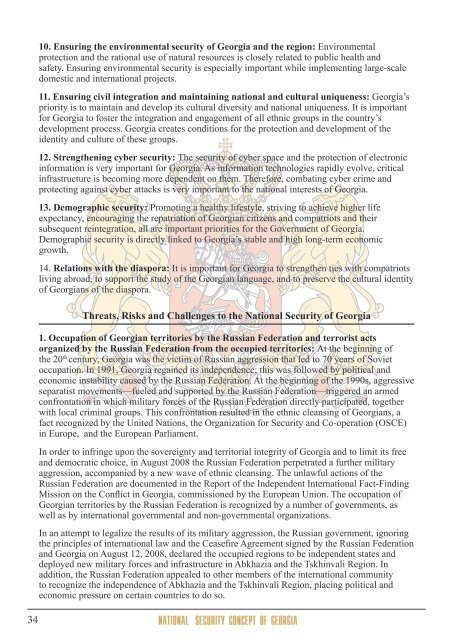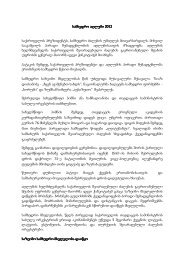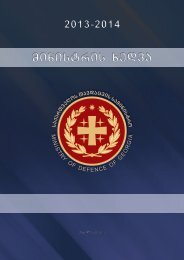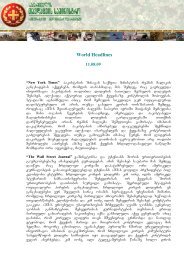saqarTvelos erovnuli usafrTxoebis koncefcia NATIONAL SECURITY
saqarTvelos erovnuli usafrTxoebis koncefcia NATIONAL SECURITY
saqarTvelos erovnuli usafrTxoebis koncefcia NATIONAL SECURITY
You also want an ePaper? Increase the reach of your titles
YUMPU automatically turns print PDFs into web optimized ePapers that Google loves.
10. Ensuring the environmental security of Georgia and the region: Environmental<br />
protection and the rational use of natural resources is closely related to public health and<br />
safety. Ensuring environmental security is especially important while implementing large-scale<br />
domestic and international projects.<br />
11. Ensuring civil integration and maintaining national and cultural uniqueness: Georgia’s<br />
priority is to maintain and develop its cultural diversity and national uniqueness. It is important<br />
for Georgia to foster the integration and engagement of all ethnic groups in the country’s<br />
development process. Georgia creates conditions for the protection and development of the<br />
identity and culture of these groups.<br />
12. Strengthening cyber security: The security of cyber space and the protection of electronic<br />
information is very important for Georgia. As information technologies rapidly evolve, critical<br />
infrastructure is becoming more dependent on them. Therefore, combating cyber crime and<br />
protecting against cyber attacks is very important to the national interests of Georgia.<br />
13. Demographic security: Promoting a healthy lifestyle, striving to achieve higher life<br />
expectancy, encouraging the repatriation of Georgian citizens and compatriots and their<br />
subsequent reintegration, all are important priorities for the Government of Georgia.<br />
Demographic security is directly linked to Georgia’s stable and high long-term economic<br />
growth.<br />
14. Relations with the diaspora: It is important for Georgia to strengthen ties with compatriots<br />
living abroad, to support the study of the Georgian language, and to preserve the cultural identity<br />
of Georgians of the diaspora.<br />
Threats, Risks and Challenges to the National Security of Georgia<br />
1. Occupation of Georgian territories by the Russian Federation and terrorist acts<br />
organized by the Russian Federation from the occupied territories: At the beginning of<br />
the 20 th century, Georgia was the victim of Russian aggression that led to 70 years of Soviet<br />
occupation. In 1991, Georgia regained its independence; this was followed by political and<br />
economic instability caused by the Russian Federation. At the beginning of the 1990s, aggressive<br />
separatist movements—fueled and supported by the Russian Federation—triggered an armed<br />
confrontation in which military forces of the Russian Federation directly participated, together<br />
with local criminal groups. This confrontation resulted in the ethnic cleansing of Georgians, a<br />
fact recognized by the United Nations, the Organization for Security and Co-operation (OSCE)<br />
in Europe, and the European Parliament.<br />
In order to infringe upon the sovereignty and territorial integrity of Georgia and to limit its free<br />
and democratic choice, in August 2008 the Russian Federation perpetrated a further military<br />
aggression, accompanied by a new wave of ethnic cleansing. The unlawful actions of the<br />
Russian Federation are documented in the Report of the Independent International Fact-Finding<br />
Mission on the Conflict in Georgia, commissioned by the European Union. The occupation of<br />
Georgian territories by the Russian Federation is recognized by a number of governments, as<br />
well as by international governmental and non-governmental organizations.<br />
In an attempt to legalize the results of its military aggression, the Russian government, ignoring<br />
the principles of international law and the Ceasefire Agreement signed by the Russian Federation<br />
and Georgia on August 12, 2008, declared the occupied regions to be independent states and<br />
deployed new military forces and infrastructure in Abkhazia and the Tskhinvali Region. In<br />
addition, the Russian Federation appealed to other members of the international community<br />
to recognize the independence of Abkhazia and the Tskhinvali Region, placing political and<br />
economic pressure on certain countries to do so.<br />
34<br />
<strong>NATIONAL</strong> <strong>SECURITY</strong> CONCEPT OF GEORGIA
















